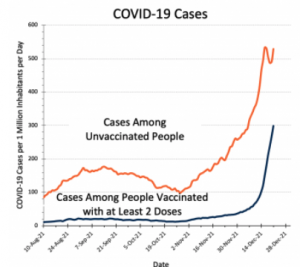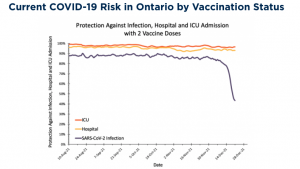Here in northern New England emergency departments are being staffed by National Guard troops. Hospitals’ ER staff – trained to handle critical care patients – are being shifted to critical and intensive care units already short-staffed due to burnout and overwork.
Hospitals are once again halting all non-emergent care as beds are full, staff are exhausted, and supplies constrained.
Omicron’s incredible transmissibility coupled with a core group of unvaccinated people is driving the disaster – and make no mistake, disaster it is.
In the UK, Omicron infections are doubling every three days.
Here in the US, Omicron accounts for three out of every four new COVID infections.
To date the evidence seems to suggest Omicron infections may be a bit milder than previous variants, although other data appears to contradict that statement. Net – it’s still early.
Two key points (source here)
- Vaccinated people are much less likely to get Omicron than the unvaxxed.

- Omicron may still infect those of us who are vaccinated, BUT the infections are relatively mild and, unlike the unvaxxed, we are MUCH less likely to be hospitalized or see the inside of an ICU.

Omicron is likely to burn very hot and very fast through our healthcare system; I’d expect that 6 – 8 weeks from now most will be behind us.
BUT – the damage COVID and the unvaxxed have done to our healthcare workers and the healthcare system will be felt for years.
- About one in five healthcare workers left their job since COVID started.
- There are far fewer healthcare workers in nursing care facilities and community care facilities for the aged today than there were pre-COVID.
- Wages for workers in those sectors are up more than 12% – which will drive costs up too.
- U.S. Bureau of Labor Statistics projects that 500,000 seasoned nurses are expected to retire between now and the end of 2022, creating a shortage of 1.1 million nurses.
Numbers are soulless. Here’s what COVID feels like to those trying to save COVID patients…
Last December, at the height of the winter surge, (a 14-year ICU nurse) cared for a patient who had caught the coronavirus after being pressured into a Thanksgiving dinner. Their lungs were so ruined that only a hand-pumped ventilation bag could supply enough oxygen. Alexander squeezed the bag every two seconds for 40 minutes straight to give the family time to say goodbye. Her hands cramped and blistered as the family screamed and prayed.
…when the same family called to ask if the staff had really done everything they could, “it was like being punched in the gut,” she told me. She had given everything—to that patient, and to the stream of others who had died in the same room. She felt like a stranger to herself, a commodity to her hospital, and an outsider to her own relatives, who downplayed the pandemic despite everything she told them. In April, she texted her friends: “Nothing like feeling strongly suicidal at a job where you’re supposed to be keeping people alive.”
Shortly after, she was diagnosed with post-traumatic stress disorder, and she left her job.
If that’s not enough, watch these videos of nurses…
Full disclosure – a family member works at Dartmouth-Hitchcock in the emergency department – this is what they deal with every day.
What this means for you.
- Do NOT have an accident, stroke, appendicitis, or slip on ice
- If hospitals in your area are still open for elective procedures, they won’t be in the very near future.
- Health insurance costs are going to spike
- More of your unvaxxed family and friends are going to die a miserable death.
- Healthcare is going to be harder to get and more expensive, waiting times will be much longer, and the healthcare experience will be more mechanical and less caring.
Get vaccinated and wear a mask. If you don’t, then take responsibility for your decision.



Covid aside; Are doctors part of the problem? This is a good read: https://www.washingtonexaminer.com/thanks-to-doctors-there-arent-enough-doctors
Thanks Brent. The article – and you – raise an excellent point. Medical doctors are part of the problem as they seek to limit supply.
be well Joe